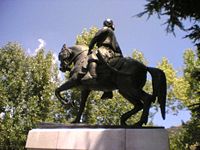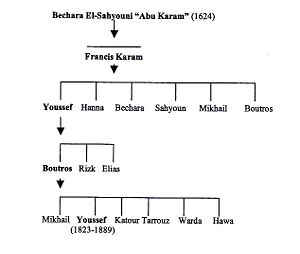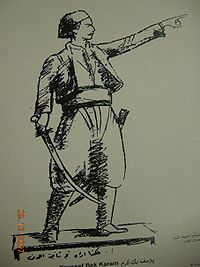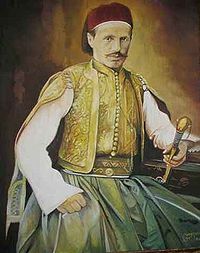
Youssef Karam
Encyclopedia

Lebanon
Lebanon , officially the Republic of LebanonRepublic of Lebanon is the most common term used by Lebanese government agencies. The term Lebanese Republic, a literal translation of the official Arabic and French names that is not used in today's world. Arabic is the most common language spoken among...
nationalist leader who led the nationalist effort against the Ottoman Empire
Ottoman Empire
The Ottoman EmpireIt was usually referred to as the "Ottoman Empire", the "Turkish Empire", the "Ottoman Caliphate" or more commonly "Turkey" by its contemporaries...
occupation.
The Karam family

Zgharta
Zgharta, or Zghorta is a large town in North Lebanon, with an estimated population of around 70,000.Zgharta is about 150 metres above sea level and lies between the rivers of Jouit and Rashein...
- Ehden
Ehden
Ehden is a mountainous town situated in the heart of the northern mountains of Lebanon and on the southwestern slopes of Mount Makmal and Kornet el Sawda, the highest peak in Lebanon...
region of North Lebanon. The word "Karam" means generosity in Arabic. This name replaced the previous name of the family which was Sahyouni.
The Karam family trace their origins to a French colonel that came from Le Mont
Le Mont
Le Mont is a commune in the Vosges department in Lorraine in northeastern France.-Geography:Le Mont is a semi-mountainous commune on the eastern edge of Lorraine, half way between Senones and the Hantz Pass. The little River Boucard, a tributary of the Rabodeau, flows through the village...
, France
France
The French Republic , The French Republic , The French Republic , (commonly known as France , is a unitary semi-presidential republic in Western Europe with several overseas territories and islands located on other continents and in the Indian, Pacific, and Atlantic oceans. Metropolitan France...
and settled in Jerusalem in 1098. His surname was Cremoir. He ruled the Sahyoun fortress, and the family was consequently known as Sahyouni family. The name Sehyoun was not replaced till the 17th century.
The name of "Karam" was not adopted till Bechara Sahyouni's earned the name "Abu-Karam" due to his phenomenal generosity. "Abu Karam" means father of generosity in Arabic. This generosity was highlighted when Emir Fakher Ad-din was greeted in Ehden
Ehden
Ehden is a mountainous town situated in the heart of the northern mountains of Lebanon and on the southwestern slopes of Mount Makmal and Kornet el Sawda, the highest peak in Lebanon...
by roads lined with soldiers offering a wide selection of food and drink to the armies of Fakher Ad-din. Fakher Ad-din went on to beat the Ottomans
Ottoman Empire
The Ottoman EmpireIt was usually referred to as the "Ottoman Empire", the "Turkish Empire", the "Ottoman Caliphate" or more commonly "Turkey" by its contemporaries...
in a historic battle in Tripoli
Tripoli
Tripoli is the capital and largest city in Libya. It is also known as Western Tripoli , to distinguish it from Tripoli, Lebanon. It is affectionately called The Mermaid of the Mediterranean , describing its turquoise waters and its whitewashed buildings. Tripoli is a Greek name that means "Three...
.
The latest leader now of the Karam family is the son of the ex-member of the Lebanese parliament Youssef Beik Karam (1910–1972) and the brother of Assaad Karam, the member of the parliament now, Salim Karam.
Birth, childhood and family

Ehden
Ehden is a mountainous town situated in the heart of the northern mountains of Lebanon and on the southwestern slopes of Mount Makmal and Kornet el Sawda, the highest peak in Lebanon...
and surrounding district), and Mariam (daughter of Sheikh Antonios Abi Khattar Al Ayntouri) in Ehden
Ehden
Ehden is a mountainous town situated in the heart of the northern mountains of Lebanon and on the southwestern slopes of Mount Makmal and Kornet el Sawda, the highest peak in Lebanon...
, Lebanon
Lebanon
Lebanon , officially the Republic of LebanonRepublic of Lebanon is the most common term used by Lebanese government agencies. The term Lebanese Republic, a literal translation of the official Arabic and French names that is not used in today's world. Arabic is the most common language spoken among...
. Raised in a family of six children: Catherine, Teresa, Rose, Eva, Mikhail and Youssef. His mother was strong, virtuous, possessed a strong personality; and had a strong influence on her son.
Youssef was a smart boy, with green eyes and fair complexion. He loved his hometown Ehden
Ehden
Ehden is a mountainous town situated in the heart of the northern mountains of Lebanon and on the southwestern slopes of Mount Makmal and Kornet el Sawda, the highest peak in Lebanon...
, with its majestic mountains and thick forests.He was French educated and at the age of 7, he was well versed in Aramaic
Aramaic language
Aramaic is a group of languages belonging to the Afroasiatic language phylum. The name of the language is based on the name of Aram, an ancient region in central Syria. Within this family, Aramaic belongs to the Semitic family, and more specifically, is a part of the Northwest Semitic subfamily,...
, Arabic
Arabic language
Arabic is a name applied to the descendants of the Classical Arabic language of the 6th century AD, used most prominently in the Quran, the Islamic Holy Book...
, French
French language
French is a Romance language spoken as a first language in France, the Romandy region in Switzerland, Wallonia and Brussels in Belgium, Monaco, the regions of Quebec and Acadia in Canada, and by various communities elsewhere. Second-language speakers of French are distributed throughout many parts...
and Italian
Italian language
Italian is a Romance language spoken mainly in Europe: Italy, Switzerland, San Marino, Vatican City, by minorities in Malta, Monaco, Croatia, Slovenia, France, Libya, Eritrea, and Somalia, and by immigrant communities in the Americas and Australia...
languages. He trained in unarmed combat, horse riding, shooting and fencing. His education in French helped him establish strong links with the west, especially France. Youssef has a special appreciation of Arabic, which was exemplified in many poetic writings.
Youssef grew up hating to play with toys, always thrusting to do what adults engage in. He was a skilled warrior, that never backed down from a challenge.
Biography
In 1840, Youssef aged 17 years, fought alongside his father and elder brother against the Egyptian armies then occupying Lebanon in the battles of Houna and Bazoun. Youssef showed remarkable skill as a warrior and leader, and his reputation and influence in the area steadily grew; so much so that in 1846, when his father died, Youssef succeeded him as ruler instead of his elder brother. Youssef ruled with fairness, and his credibility and influence as a soldier and politician continued to grow.Youssef Karam became the acknowledged leader of the district, and in time one of the most powerful personalities in Lebanese Politics. And although politically and militarily very powerful, he remained ever loyal to his faith and to the Church. Karam's loyalty to the Church and to Bkerke
Bkerké
Bkerké is the See of the Maronite Catholic Patriarchate, located 650 m above the bay of Jounieh in Lebanon....
, the seat of the Maronite Patriarch, never wavered, and this loyalty was to have far reaching implications in future years.
In 1858, when the farmers of the predominantly Maronite Kisrawan district staged an uprising against their Sheikhs and landlords, the Khazen family, the Maronite Patriarch, conscious of Karam's influence and his loyalty to the Church, appealed to Karam to save the Sheiks and restore peace to the area. Karam did save the Sheiks and managed to restore peace without resorting to force, and avoided what was expected to be a long and bloody conflict.
.jpg)
Ottoman Empire
The Ottoman EmpireIt was usually referred to as the "Ottoman Empire", the "Turkish Empire", the "Ottoman Caliphate" or more commonly "Turkey" by its contemporaries...
ruled Lebanon, there existed a certain amount of distrust between the Druze
Druze
The Druze are an esoteric, monotheistic religious community, found primarily in Syria, Lebanon, Israel, and Jordan, which emerged during the 11th century from Ismailism. The Druze have an eclectic set of beliefs that incorporate several elements from Abrahamic religions, Gnosticism, Neoplatonism...
and Maronite Communities. The Muslim
Muslim
A Muslim, also spelled Moslem, is an adherent of Islam, a monotheistic, Abrahamic religion based on the Quran, which Muslims consider the verbatim word of God as revealed to prophet Muhammad. "Muslim" is the Arabic term for "submitter" .Muslims believe that God is one and incomparable...
Druze
Druze
The Druze are an esoteric, monotheistic religious community, found primarily in Syria, Lebanon, Israel, and Jordan, which emerged during the 11th century from Ismailism. The Druze have an eclectic set of beliefs that incorporate several elements from Abrahamic religions, Gnosticism, Neoplatonism...
felt threatened by the growing presence of the Christians Maronites in their traditional area of Mount Lebanon
Mount Lebanon
Mount Lebanon , as a geographic designation, is a Lebanese mountain range, averaging above 2,200 meters in height and receiving a substantial amount of precipitation, including snow, which averages around four meters deep. It extends across the whole country along about , parallel to the...
. The suspicion and distrust between the two Communities was allowed to be fueled by petty and personal conflicts until September 1859 when finally open conflict broke out between the Druze and Maronite Communities at Beit Mery, a town of different religious denominations. Karam reacted by calling a meeting of Community leaders at the village of Baan, and concluded an agreement with the Muslim ruler of Tripoli
Tripoli
Tripoli is the capital and largest city in Libya. It is also known as Western Tripoli , to distinguish it from Tripoli, Lebanon. It is affectionately called The Mermaid of the Mediterranean , describing its turquoise waters and its whitewashed buildings. Tripoli is a Greek name that means "Three...
, North Lebanon, Abed El Hamid Karami, to keep North Lebanon free from any religious conflict.
In May 1860 however, conflict again broke out between the two Communities, and a number of Maronite Monks and villagers were massacred. This time Karam reacted by raising an army of 500 men to protect the Maronites in the Mount Lebanon area. On the 2nd June 1860, Karam and his men marched to Bkerke
Bkerké
Bkerké is the See of the Maronite Catholic Patriarchate, located 650 m above the bay of Jounieh in Lebanon....
and offered to the Maronite Patriarch their protection of Maronites.
In Karam's mind however, there was no doubt that the conflict between the Druze
Druze
The Druze are an esoteric, monotheistic religious community, found primarily in Syria, Lebanon, Israel, and Jordan, which emerged during the 11th century from Ismailism. The Druze have an eclectic set of beliefs that incorporate several elements from Abrahamic religions, Gnosticism, Neoplatonism...
and the Maronites was being nurtured by Khorshid Pasha, the then Turkish Foreign Affairs Minister, for the purpose of justifying continued Ottoman
Ottoman Empire
The Ottoman EmpireIt was usually referred to as the "Ottoman Empire", the "Turkish Empire", the "Ottoman Caliphate" or more commonly "Turkey" by its contemporaries...
rule in Lebanon and to counter Karam's calls for a free and sovereign Lebanon. Turkey at that time was a mighty power that ruled Lebanon and surrounding Arab countries. The Ottoman Empire rule was harsh and prejudicial against Lebanese. Taxes were unjust and aimed largely at the poor. Khorshid Pasha saw Karam's calls for Lebanese self rule as a threat to Turkish interests in Lebanon and the area, and convinced the European Ambassadors that Turkish presence in Lebanon was essential to maintain peace between warring factions in Lebanon. The French Ambassador to Lebanon convinced Karam to halt his march at Bekfaya, near Kisrwan, in return for guarantees of safety for all Christians offered by Khorshid.
Several days later however, Christian villages were attacked and Christians massacred by Druzes aided by Turkish forces. In addition, Khorshid ordered Turkish Marines to effect a sea blockade to stop food and military supplies entering Lebanon and reaching Christians areas. Karam and his army retaliated against Druze and Turkish forces, and succeeded in saving the majority of Christian towns and villages in the Kisrawan area. Christian presence in the area was therefore established. Eventually, French ships reached the port of Beirut with supplies and the Turkish sea blockade ended. Peace was then restored whilst a new constitution was drafted to provide how Lebanon was to be governed. In the interim, two provisional Governors were appointed to rule Lebanon, one to rule Christians and the other to rule the Muslims. Karam was appointed the Governor of all Christians in Lebanon (Kaem Makam) on the 17th November 1860. Again, Karam ruled with distinction, restoring law and order, re-organising public institutions and conducting an honest government. However, he still refused to allow foreigners to interfere with Government affairs, or allow foreign troops on Lebanese soil. As Kaem Makam, Karam tendered his resignation a number of times in protest against what he saw as Turkish insistence to provide for continued Turkish rule in the proposed Lebanese constitution. On each occasion he was persuaded to remain in office by the French Ambassador who always suggested further negotiations.
The new constitution was finally completed in June 1861 and provided for a Governor to rule all of Lebanon for a trial three year period. Again a foreigner was appointed to the position, an Ottoman Christian by the name of Dawood Pasha.
First exile
This decision angered all Lebanese nationals, Christians and Muslims, who were hopeful for self rule. Dawood Pasha was unpopular and his rule therefore ineffectual in the face of Lebanese opposition. Towin Lebanese support, Dawood offered Karam a senior Government post, the Commander of National Forces. Karam promptly refused and insisted on nothing less than self rule for Lebanon. Thisangered Dawood who then issued an order exiling Karam to Turkey without any trial.Karam remained in Turkey for 2.5 years, from late 1861 to 1864. He was given to understand that if he remained outside of Lebanon, his people would receive better treatment, and Dawood's term in Office would not be renewed after three years.

- End of all foreign rule in Lebanon,
- Abolition of the 'Mutassarafiya' doctrine which prohibted Lebanese sovereignty and independence,
- End of high taxes and levies,
- Abolition of imprisonment without trial,
- Expulsion of all regular Turkish troops from Lebanon.
At that time, Turkish regular troops were stationed in Lebanon contrary to the provisions of the new constitution, brought in by Dawood Pasha on the pretext that Lebanese forces were unable to maintain peace in Lebanon. The Maronite Patriarch had already pleaded with Dawood to withdraw all his troops from Lebanon, to reduce excessive taxes and to release political prisoners held without trial. The Turkish Government, through Dawood Pasha, rejected all these pleas and thus the stage was set for a major confrontation.
Many battles followed, one of the earliest being at Mo'amailtayn, Jounieh
Jounieh
Jounieh is a Mediterranean coastal city about 16 kilometers north of Beirut, Lebanon. Jounieh is known for its seaside resorts, pubs, restaurants and nightclubs, as well as its old stone souk, ferry, and cablecar , which takes passengers up the mountain to the shrine of Our Lady of Lebanon in...
on the 6th January 1866. There Karam was attending Mass at St. Doumit Church when regular Turkish troops attacked his men stationed outside the Church. A fierce battle followed, and Karam, aided by neighbouring villagers, defeated the Turkish troops. Karam immediately wrote to Istanbul and European Governments detailing the causes of conflict, and claiming his people's right to defend themselves.
Dawood Pasha however, was determined to rid himself of Karam and deal a fatal blow to the Lebanese nationalist movement. Dawood instructed his military Commander, Amin Pasha, to arrange a meeting with Karam in the presence of the Maronite Archbishop at Karem Saddah, and there gain Karam's allegiance to Dawood's Government. The meeting was arranged for Sunday the 28th January 1866. Karam agreed to Dawood's request on condition that Dawood accede to the Patriarch's pleas. Whilst the meeting was in progress, Turkish troops were sighted advancing at nearby Bnasha toward Karem Saddah.
The meeting was abandoned, and one of the fiercest battles was fought at Bnasha involving some 800 of Karam's men opposing several thousand Turkish troops. Here, Karam won a decisive victory. This led to other victories which included:
- Sebhell l st March 1866
- Ehmej 14 March 1866
- Wadi El Salib 22 March 1866
- Aytou 5 May 1866
- Ey El Yawz 7 June 1866
- Wadi Miziari 20 August 1866
- Ehden 15 December 1866
- Ejbeh 10 January 1867 and
- Wadi El Sabeeb 17 January 1867
Karam never lost a single battle. He and his army felt their cause was just, they enjoyed wide and popular support, were familiar with the countryside, and were therefore able to out manoeuvre the enemy. So successful was Karam, that he finally decided to march on 'Beit El Din', the Governor's residence, over-throw Turkish rule and install a Lebanese national Government. Thousands of people joined Karam in his march to 'Beit El Din', and Dawood Pasha was forced to flee to Beirut. Victory must have seemed imminent to Karam and his men.
In Beirut however, Dawood Pasha rallied support from the European Ambassadors. These emissaries warned Karam that as their Government were parties to the Lebanese constitution which allowed Turkish rule over Lebanon, they were bound to support Turkey and would actively oppose Karam and refuse to recognise any Government he may form.
Second exile
At a meeting at Bkerke, the French Ambassador ordered Karam in the name of Napoleon III, to leave Lebanon in return for French guarantees of safety for his men and people and the implementation of all of Karam's national demands. Karam was warned that to refuse would mean to place his men and the welfare of his people in jeopardy. On Thursday the 31st January 1867, Karam left Lebanon on board a French ship bound for Algeria.Karam traveled from Algeria to European capitals explaining the plight of the Lebanese people and stressing their desire to form a sovereign and independent state. Whilst there, he wrote many letters and memoirs in support of self rule for Lebanon. Most of his writings have survived to this day, and include:-
Karam also traveled to European capitals seeking economic help for Lebanon. He offered to mortgage all his personal Lebanese holdings, amounting to five million francs, to French businessmen in return for the establishment of coal mines and a railroad network in Lebanon.
On the 7th April, 1889, Karam died near Naples
Naples
Naples is a city in Southern Italy, situated on the country's west coast by the Gulf of Naples. Lying between two notable volcanic regions, Mount Vesuvius and the Phlegraean Fields, it is the capital of the region of Campania and of the province of Naples...
, Italy
Italy
Italy , officially the Italian Republic languages]] under the European Charter for Regional or Minority Languages. In each of these, Italy's official name is as follows:;;;;;;;;), is a unitary parliamentary republic in South-Central Europe. To the north it borders France, Switzerland, Austria and...
. His last words were "God ... Lebanon". He is buried in Saint George's Church in Ehden
Ehden
Ehden is a mountainous town situated in the heart of the northern mountains of Lebanon and on the southwestern slopes of Mount Makmal and Kornet el Sawda, the highest peak in Lebanon...
, Lebanon
Lebanon
Lebanon , officially the Republic of LebanonRepublic of Lebanon is the most common term used by Lebanese government agencies. The term Lebanese Republic, a literal translation of the official Arabic and French names that is not used in today's world. Arabic is the most common language spoken among...
where in 1932 a statue of Karam on his horse was erected. This statue was made by his namesake Youssef Howayek
Youssef Howayek
Youssef Saadallah Howayek a painter and sculptor from Helta, in modern day Lebanon.-Career:Youssef Farroukh's father, Saadallah Howayek, was a Councillor elected into the Ottoman Mutasarref's Administrative Council. His grandfather was the village priest and his uncle was the Patriarch...
. The Italian hosts place a placard on his grave that reads: "this is the resting place of the Youssef Boutros Karam, the Lebanese Prince". Even though, he was never officially a prince, this title was bestowed upon him affectionately due to his stature, behavior, and moral values.
Beliefs
Youssef Karam was an early advocate of forming a united world assembly that would protect the rights of small nations. He was also a champion of human rights, justice and freedom. His strongest quality was his ability to surmount enormous odds. He fought tyrannies, human right abuses and social discrimination. Due to his high ethical standards, he refused to live the life of opulence and luxury.Many of his beliefs were extracted from among other sources:
- An open letter in which Karam calls for the establishment of a 'League of Nations' or 'Human Rights Association' as he called it. Karam explained that this would be an International Organisation, which would work for world peace and guarantee the rights of small nations.
- A letter to Amir Abdul Kader AI Jazaa'irri encouraging him to liberate all ArabArabArab people, also known as Arabs , are a panethnicity primarily living in the Arab world, which is located in Western Asia and North Africa. They are identified as such on one or more of genealogical, linguistic, or cultural grounds, with tribal affiliations, and intra-tribal relationships playing...
s from OttomanOttoman EmpireThe Ottoman EmpireIt was usually referred to as the "Ottoman Empire", the "Turkish Empire", the "Ottoman Caliphate" or more commonly "Turkey" by its contemporaries...
occupation and then establishing a form of 'Arab LeagueArab LeagueThe Arab League , officially called the League of Arab States , is a regional organisation of Arab states in North and Northeast Africa, and Southwest Asia . It was formed in Cairo on 22 March 1945 with six members: Egypt, Iraq, Transjordan , Lebanon, Saudi Arabia, and Syria. Yemen joined as a...
', where each member State would retain sovereignty and independence.
Many people in his home town refer to him as "The Rebellious Prince".

